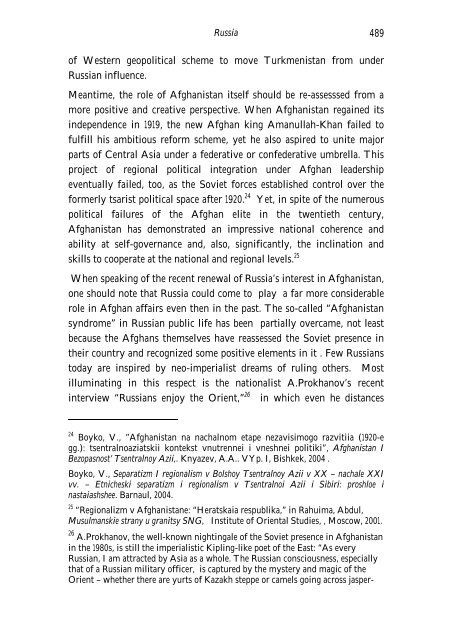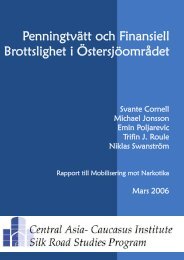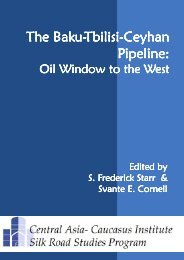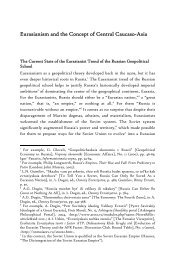Russia - Central Asia-Caucasus Institute and Silk Road Studies ...
Russia - Central Asia-Caucasus Institute and Silk Road Studies ...
Russia - Central Asia-Caucasus Institute and Silk Road Studies ...
Create successful ePaper yourself
Turn your PDF publications into a flip-book with our unique Google optimized e-Paper software.
<strong>Russia</strong> 489<br />
of Western geopolitical scheme to move Turkmenistan from under<br />
<strong>Russia</strong>n influence.<br />
Meantime, the role of Afghanistan itself should be re-assesssed from a<br />
more positive <strong>and</strong> creative perspective. When Afghanistan regained its<br />
independence in 1919, the new Afghan king Amanullah-Khan failed to<br />
fulfill his ambitious reform scheme, yet he also aspired to unite major<br />
parts of <strong>Central</strong> <strong>Asia</strong> under a federative or confederative umbrella. This<br />
project of regional political integration under Afghan leadership<br />
eventually failed, too, as the Soviet forces established control over the<br />
formerly tsarist political space after 1920. 24 Yet, in spite of the numerous<br />
political failures of the Afghan elite in the twentieth century,<br />
Afghanistan has demonstrated an impressive national coherence <strong>and</strong><br />
ability at self-governance <strong>and</strong>, also, significantly, the inclination <strong>and</strong><br />
skills to cooperate at the national <strong>and</strong> regional levels. 25<br />
When speaking of the recent renewal of <strong>Russia</strong>’s interest in Afghanistan,<br />
one should note that <strong>Russia</strong> could come to play a far more considerable<br />
role in Afghan affairs even then in the past. The so-called “Afghanistan<br />
syndrome” in <strong>Russia</strong>n public life has been partially overcame, not least<br />
because the Afghans themselves have reassessed the Soviet presence in<br />
their country <strong>and</strong> recognized some positive elements in it . Few <strong>Russia</strong>ns<br />
today are inspired by neo-imperialist dreams of ruling others. Most<br />
illuminating in this respect is the nationalist A.Prokhanov’s recent<br />
interview “<strong>Russia</strong>ns enjoy the Orient,” 26 in which even he distances<br />
24<br />
Boyko, V., ”Afghanistan na nachalnom etape nezavisimogo razvitiia (1920-e<br />
gg.): tsentralnoaziatskii kontekst vnutrennei i vneshnei politiki”, Afghanistan I<br />
Bezopasnost’ Tsentralnoy Azii,. Knyazev, A.A.. VYp. I, Bishkek, 2004 .<br />
Boyko, V., Separatizm I regionalism v Bolshoy Tsentralnoy Azii v XX – nachale XXI<br />
vv. – Etnicheski separatizm i regionalism v Tsentralnoi Azii i Sibiri: proshloe i<br />
nastaiashshee. Barnaul, 2004.<br />
25<br />
“Regionalizm v Afghanistane: “Heratskaia respublika,” in Rahuima, Abdul,<br />
Musulmanskie strany u granitsy SNG, <strong>Institute</strong> of Oriental <strong>Studies</strong>, , Moscow, 2001.<br />
26<br />
A.Prokhanov, the well-known nightingale of the Soviet presence in Afghanistan<br />
in the 1980s, is still the imperialistic Kipling-like poet of the East: “As every<br />
<strong>Russia</strong>n, I am attracted by <strong>Asia</strong> as a whole. The <strong>Russia</strong>n consciousness, especially<br />
that of a <strong>Russia</strong>n military officer, is captured by the mystery <strong>and</strong> magic of the<br />
Orient – whether there are yurts of Kazakh steppe or camels going across jasper-






